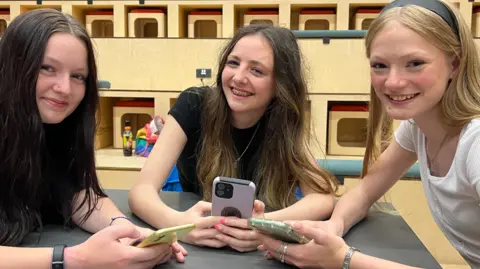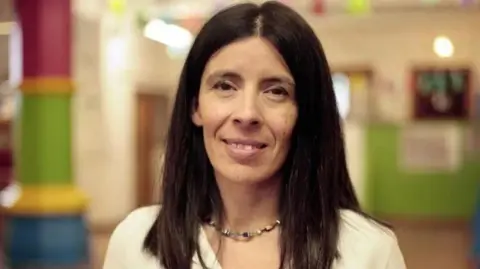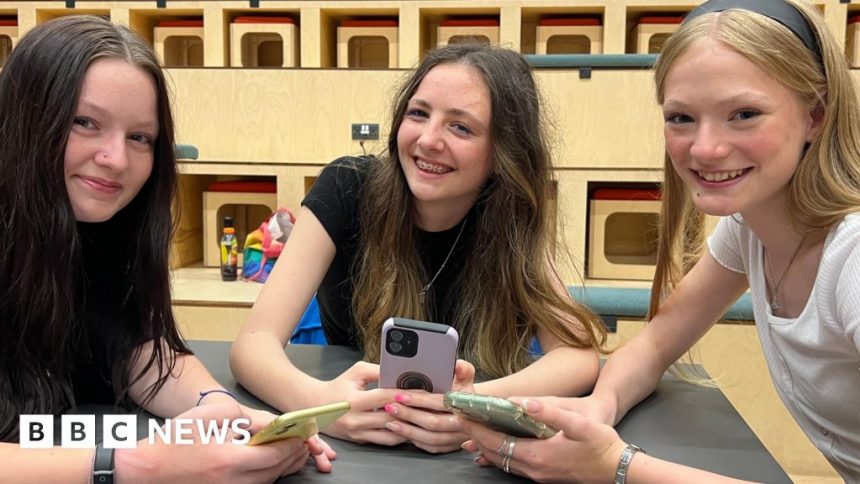Most children don’t tell family about online life
 BBC
BBCOnly 28% of schoolchildren in Wales tell their families about their online lives, according to a new report.
The survey found “rude and aggressive” and “toxic” behaviour was experienced by youngsters on digital platforms.
The research for the Children’s Commissioner for Wales Rocio Cifuentes quizzed young people aged seven to 18 from 16 counties.
Children told the BBC conversations on gaming platforms could “easily turn into threats”, and that if parents were not constantly watching things could escalate fast.
Ffion,16, from Cardiff, said: “I think a lot of it starts with banter just on games and stuff but it can obviously easily turn into threats and stuff like that.”
Courtney, also 16 and from Cardiff, said: “The majority of social media in games and stuff… seem to be lowering the restrictions they have.
“So there’s more things you can do on there, which I think is a bit weird because surely you should be adding to the restrictions to make it more safe.”
Grace, 13, said her mum monitored some of her accounts to make sure “nothing weird is going on”.
Grace said: “You’re always going to have the people who come on and ask you questions that you don’t want to answer.
“And sometimes no matter how hard you try to block them or remove yourself from the situation they can use hacks to get around all of that.”
Media regulator Ofcom is aiming to finalise a code of practice to protect children from harmful and dangerous content by next spring.
A total of 1,284 young people took part in the survey and it found 76% of children felt happy and safe online and that if they saw something which upset or worried them they would tell their families and report it to the platform.
But it also found only 32% felt their concerns were taken seriously.
Teachers expressed concerns about the effect screen time had on children’s education. Some reported tiredness among pupils because of late night gaming.
Concerns about Snapchat, YouTube and game platform Roblox were highlighted. Some young people said they had felt unsafe online because users can talk to people they don’t know.

Ms Cifuentes said social media companies had been able to overlook children’s safety, and Ofcom had a “vital” role in holding them to account.
She said children did not always feel safe online.
“We heard from children as young as nine, telling us that they were having uncomfortable conversations with strangers, or that they had experienced aggressive users, or had seen inappropriate content,” she said.
Conversations with families were “crucial”.
“Less than a third of children told us they speak to their parents a lot about what they are doing online,” Ms Cifuentes said.
She encouraged parents to talk to their children about what they are doing online.
Ms Cifuentes said: “When we asked children which particular apps make children feel uncomfortable or unsafe, the ones that were most often mentioned were Roblox, YouTube and also Snapchat.
“Parents should really try and find out about the types of apps their children are using and also the different guidelines.”
The survey findings have been shared with Ofcom. Ms Cifuentes’s office is joining forces with other UK children’s commissioners as she said the problem was UK wide.
NSPCC Cymru’s Ruth Mullineux said the charity continued to call for implementation of the Online Safety Act by Ofcom to ensure tech companies introduce measures to prioritise children’s safety.
“Policy makers and regulators need to be considering young people’s views to understand the realities of the issues they face online and deliver effective responses,” she added.
Elinor Williams of Ofcom Wales said the watchdog had set out more than 40 practical measures which put the responsibility of keeping children safe on tech firms.
Once Ofcom finalised its code of practice, she said, it would not hesitate to use its powers to hold platforms to account.







